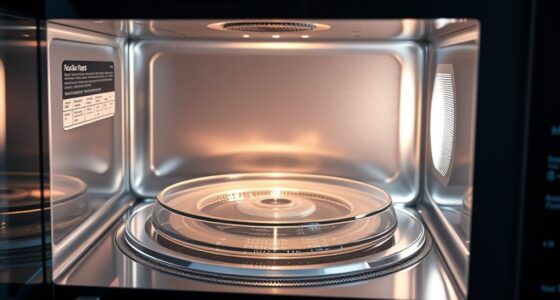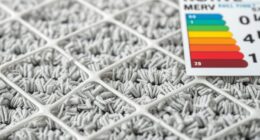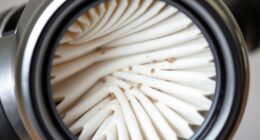To keep your ice cream maker safe, make sure you clean it thoroughly after each use to prevent bacteria buildup and contamination. Check all removable parts and gaskets, and dry everything completely before storing. Regularly inspect the electrical cords and seals for damage. Follow your manufacturer’s instructions for cleaning and maintenance to guarantee proper function. Keeping up with these steps helps protect your health and keeps your treats safe—keep going for more tips.
Key Takeaways
- Regularly clean all removable parts, including paddles and bowls, with warm, soapy water to prevent bacterial growth.
- Check for damage to electrical cords, plugs, seals, and gaskets to avoid electrical hazards and contamination.
- Ensure all components are completely dry before reassembly to prevent mold and bacterial proliferation.
- Follow manufacturer guidelines for proper storage, cleaning routines, and maintenance to ensure safety and longevity.
- Inspect your ice cream maker periodically for signs of wear or residue buildup that could compromise safety.

Ever wondered if your ice cream maker is safe to use? Ensuring your appliance is safe isn’t just about avoiding a messy cleanup; it’s about protecting your health and making sure every batch you create is delicious and worry-free. The first step is understanding the importance of food safety when using your ice cream maker. Improper maintenance can lead to bacterial growth, spoilage, or contaminated ice cream, which is the last thing you want. That’s why following some simple maintenance tips is essential to keep your device functioning properly and your treats safe to enjoy.
Start by thoroughly cleaning your ice cream maker after each use. Food residues, dairy, or fruit bits left behind can harbor bacteria if not cleaned correctly. Use warm, soapy water and a soft brush or cloth to scrub all removable parts, including the paddle, bowl, and lid. Avoid abrasive cleaners that could damage parts or leave harmful residues. Make sure to dry everything completely before reassembling to prevent mold growth. Some ice cream makers have parts that are dishwasher safe, so check the manufacturer’s instructions to simplify the cleaning process. Proper cleaning not only removes visible debris but also helps eliminate microscopic bacteria that can cause foodborne illnesses.
Pay close attention to the freezing bowl or compressor components, depending on your model. If your ice cream maker has a removable bowl, ensure it is thoroughly cleaned and properly stored in the freezer if required. For models with built-in refrigeration, keep the compressor vents clear and avoid overloading the machine, which can cause overheating or mechanical issues. Regularly inspecting electrical cords and plugs for damage is also part of good maintenance tips. Damaged cords can pose electrical hazards or cause the machine to malfunction, jeopardizing food safety. Additionally, proper maintenance, including checking seals and gaskets, helps prevent contamination and ensures the appliance functions as intended. Regularly inspecting the appliance for signs of wear can help prevent contamination and mechanical failures, safeguarding your health. Proper storage in a dry, cool place also helps prevent damage and contamination. Maintaining the correct temperature during storage and operation is also crucial for food safety. Furthermore, consulting the manufacturer’s guidelines can provide specific instructions tailored to your model, ensuring optimal safety practices.
Additionally, be mindful of how long your ice cream maker has been stored unused. If you haven’t used it for several months, give it a deep clean before the next batch, checking for any signs of mold or residue. Proper storage in a dry, cool place also helps prevent damage and contamination. Always follow the manufacturer’s guidelines for maintenance and cleaning routines to maintain your machine’s safety and efficiency. Incorporating regular maintenance routines can significantly extend the lifespan of your appliance and ensure every batch remains safe and delicious.
Frequently Asked Questions
Can My Ice Cream Maker Cause Food Poisoning?
Your ice cream maker can cause food poisoning if you don’t clean it properly, leading to food contamination or mold growth. Bacteria thrive in leftover moisture and dirt, which can contaminate your ice cream and make you sick. To prevent this, wash all parts thoroughly after each use and store the machine in a dry, clean place. Regular maintenance keeps your machine safe and your treats delicious.
Are There Specific Cleaning Agents I Should Avoid?
You should avoid harsh detergents and certain cleaning chemicals when cleaning your ice cream maker. These harsh cleaning chemicals can leave residues that contaminate your machine and affect the taste of your ice cream. Instead, opt for gentle, food-safe cleaning agents or warm water with mild soap. Make sure to rinse thoroughly to remove any leftover cleaning chemicals, ensuring your ice cream maker stays safe and clean for use.
How Often Should I Replace the Machine’s Parts?
You should follow your ice cream maker’s recommended part replacement schedule to guarantee ideal machine maintenance. Typically, check parts like seals, blades, and churns every few months and replace them if you notice wear or damage. Regularly inspecting these components helps prevent malfunctions and maintains safety. Adhering to the suggested part replacement schedule keeps your machine running smoothly and extends its lifespan, so stay proactive with your maintenance routine.
Is It Safe to Use Homemade Ingredients?
Using homemade ingredients can be safe for your ice cream if you follow proper hygiene and storage practices. Make certain all ingredients are fresh, thoroughly cleaned, and free from contaminants. Check your ice cream maker for any damage or buildup that could affect ice cream safety. Always refrigerate or freeze homemade ingredients promptly, and clean your machine regularly. These steps help maintain ice cream safety and ensure your homemade treats are delicious and safe to enjoy.
What Signs Indicate My Ice Cream Maker Is Malfunctioning?
Your ice cream maker might be sending you warning signs like a machine overheating or strange noises, which are like smoke signals alerting you to trouble. If your machine gets unusually hot or makes grinding, squealing, or banging sounds, it’s time to stop and inspect. These signs indicate potential malfunctions that could damage the machine or cause safety hazards. Always listen to your machine’s cues to keep your treats safe and delicious.
Conclusion
So, before you scoop up that sweet, creamy treat, make sure your ice cream maker is playing it safe. Think of it as a trusty steed—if you ignore its warnings, it might buck back at you. Regular cleaning and proper maintenance are your armor against mishaps. Keep it in check, and you’ll enjoy countless delicious adventures without a hitch—turning your kitchen into a sweet sanctuary, one safe scoop at a time.









